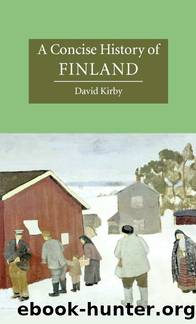A Concise History of Finland by David Kirby

Author:David Kirby [Kirby]
Language: eng
Format: epub, pdf
Publisher: Cambridge University Press
Published: 2013-11-29T00:00:00+00:00
The circumstances which dictated the contours of Finnish politics in the 1920s ensured that the Swedish Peopleâs Party had a voice and was able to exercise influence, in government and in parliament. As a party, it was a peculiar and at times uneasy coalition of right-wingers who still entertained considerable reservations about parliamentary democracy and liberals who at one stage formed their own parliamentary group; but as a pressure group dedicated to protecting the interests of a linguistic minority, it worked well, exploiting the divisions within the party political system to good effect.
It is more difficult to make the case for communism as a part of the Finnish landscape. Certainly, its opponents saw it as an evil, Russian-inspired doctrine with which the embittered exiled leadership of the failed rebellion of 1918 sought to infect the people. But those who were drawn to communism could not so easily be dismissed as alien and unpatriotic. They were after all undeniably of the people, a people in which Finnish nationalism had pinned its faith for decades. The accusation levelled by Swedish-speaking right-wingers such as the poet Bertel Gripenberg that the Finnish people, having been inflamed for years by irresponsible nationalists and then socialists, were especially receptive to the seductive wiles of bolshevism, was an embarrassment for those in the Finnish camp. Although such accusations were angrily rebuffed, there was considerable heart-searching in the years immediately following the civil war about the perceived immaturity and lack of culture of the Finnish people, and no shortage of remedies to deal with this. For the writer Volter Kilpi, the âwild, perfidious suspiciousness and the black, base desire for revenge that seems to float in the blood of our people like a lurking beastâ could only be controlled by firm, authoritative government and energetic social reforms. The socialist and strong supporter of prohibition, Väinö Voionmaa, believed that âthe immense political and societal lack of culture of our peopleâ required âpuritanism and a bit of rough smithingâ, not what the Swedish-speaking elite offered, an âaesthetic-individualist-aristocratic isolation from the plebsâ. Crude, ignorant, feared and even hated by some, misguided in the eyes of others, the communist was nevertheless a Finnish reality, who could not be portrayed and demonised as of an alien race or culture; it is significant that both Kilpi and Voionmaa, for example, speak of âour peopleâ, however unattractive elements of the people had now become.
The Finnish Communist Party was founded in Moscow by a group of exiled red leaders in August 1918. With all the fervour of the newly converted, it embraced revolution and fiercely rejected the moderate parliamentary tactics of the old labour movement, urging the Finnish proletariat to boycott the eduskunta elections in March 1919. This appeal was massively ignored. The revived Social Democratic Party retained the loyalty of its members and electorate. In spite of the losses suffered as a result of the civil war, party membership topped 67,000 by the end of 1919, and a third of a million voted socialist in the elections.
Download
This site does not store any files on its server. We only index and link to content provided by other sites. Please contact the content providers to delete copyright contents if any and email us, we'll remove relevant links or contents immediately.
The European Opportunity by Felipe Fernández-Armesto(569)
The European History Highway: A Guide to Internet Resources by Dennis A. Trinkle Scott A. Merriman(535)
Morgan Kaufmann Digital Watermarking and Steganography by Ingemar Cox Matthew Miller Jeffrey Bloom Jessica Fridrich Ton(528)
The Seven Wonders of the Ancient World by Michael Denis Higgins(518)
Hyperculture by Byung-Chul Han(505)
European Security in a Global Context by Thierry Tardy(504)
European Security without the Soviet Union by Stuart Croft Phil Williams(501)
The Routledge companion to Christian ethics by D. Stephen Long Rebekah L. Miles(497)
Get Real with Storytime by Julie Dietzel-Glair & Marianne Crandall Follis(443)
Hudud Al-'Alam 'The Regions of the World' - a Persian Geography 372 A.H. (982 AD) by V. V. Minorsky & C. E. Bosworth(436)
Gorbachev And His Generals by William C. Green(427)
Tibetan Studies in Comparative Perspective by Chih-yu Shih Yu-Wen Chen(427)
Governance, Growth and Global Leadership by Espen Moe(417)
How Languages Are Learned 5th Edition by Patsy M Lightbown;Nina Spada; & Nina Spada(406)
CliffsNotes on Fitzgerald's The Great Gatsby by Kate Maurer(398)
The Oxford History of the World by Fernández-Armesto Felipe;(388)
The Egyptian Economy, 1952-2000 by Khalid Ikram(377)
Oral Poetry and Narratives from Central Arabia: The Poetry of Ad-Dindan : A Bedouin Bard in Southern Najd (Studies in Arabic Literature, Vol 17) (English and Arabic Edition) by P. M. Kupershoek P. Marcel Kurpershoek(365)
The Oxford Handbook of the Incas by Sonia Alconini(364)
